| Article Overview:
When you multiply 250,000 American troops in Iraq times all the people
they know in America, you come up with 62 million "friends of the
Warriors of Vigilance." Americans and the world can view
the war in Iraq with one eye or both eyes open. If they
open both, they realize the war is being decided by the warriors and
not the leaders. They realize it is being fought by friends and
neighbors, not by criminals and warmongers. Using binocular
rather than monocular vision requires the viewer to look in the mirror
and decide whether he or she supports or denies their friends, and
their moral constitutionality. |
 VigilanceVoice VigilanceVoice

www.VigilanceVoice.com
Tuesday--March
25, 2003—Ground Zero Plus 559
___________________________________________________________
250,000
x's 250 = 62 Million Friends Of American Warriors
___________________________________________________________
by
Cliff McKenzie
Editor, New York City Combat Correspondent News
|
GROUND ZERO, New York City, Mar. 25-- There is a rule of friendship.
It follows a natural order. The rule of friendship states that
each person knows about 250 people. For example, if one is
inviting people to a wedding, taxing the imagination and memory
results in a list of about 250. Another benchmark is
funerals. When a person dies, about 250 show up to pay
their respects.
To test this theory, one needs only to
imagine oneself being visited by the President of the United States,
and being told to make a list of 250 people they know who would also
like to attend the meeting. See how quickly the list would
develop.

|
|
Everyone has
250 names listed |
Or,
if you're not into politics, consider this. You have been
granted $1 million tax free with one catch. You must produce a
list of 250 names of people you know, with addresses or phone numbers,
old or new, who will attest they know you or knew you.
Suddenly, the idea of knowing so many
people doesn't seem so far out of reach.
Practically, it isn't. But we
don't often think of how many others we know until we are faced with a
reason to reach back in our memory and extract what some might call
"rolodex facts."
Today, however, there is reason to pull out
one's rolodex.
In a far distant land called Iraq, 250,000
Americans are putting their lives on the line for an elusive and often
criticized concept called Liberty.
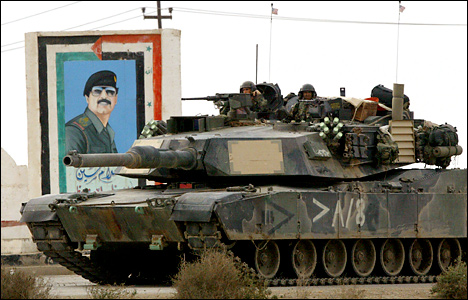 |
|
Marines in
Nasiriya |
Despite all the protests hurled at the United States for waging war on
Saddam Hussein's regime of tyranny and oppression, when the smoke
clears there is one clear and concise reason. It is to remove
the tyranny and oppression we saw when Iraqi television broadcast
brutal pictures of American dead and wounded prisoners.
For the armchair critics, it is easy
to shout down the idea of war. War, of course, is an ugly
scene. Its nature is death. It brings out the
worst in human beings, and the best.
But fighting for Freedom and Liberty
for those under the thumbscrews of tyranny and oppression is not such
a bad idea.
Again, the televised scenes of
American prisoners serve as examples of what American soldiers,
Marines, airmen, and naval personnel are facing. They are
fighting the Beast of Terror. They are not seeking
conquest over the land. There is no desire for America to
colonize Iraq, or to annex it as the 51st State of the Union.
When all is said and done, there is
only one goal--to free the people from a dictatorship that denies them
fundamental human rights. The most basic of these is
the right to elect their own leadership, and the right eject that
leadership democratically if it is not meeting the expectations of the
citizens.
Neither of those principles
exist today in Iraq. Nor does the right of dissent.
When looking at the war in
Iraq, the viewer has two choices. He or she can see one
entity fighting it--America vs. the world. Under this
monocular view, there is one person in charge--President Bush and the
U.S. Administration. This tends to be the view of
protestors who indict our Commander-in-Chief for conducting an
"illegal war." It also tends to be the view of nations
like France and Germany who defy America's right to unilaterally fight
Terrorism.
But there is another
view, far more important than the monocular. It involves depth
and depth perception. It is the binocular view. It is
seeing both sides as well as the middle.
Viewing with binoculars,
one sees the war being fought not by the President of the United
States, but by 250,000 Americans--the men and women next door.
There are also the nearly 50,000 British warriors, as well as the
2,000 Australians in support of ridding Iraq of Saddam's Terrorism.
 |
|
The binocular
view |
The public forgets wars aren't fought by generals or presidents or
prime ministers. They may push the buttons that start wars, but
they do not fight them.
The average
American, Brit or Aussie fights wars.
The average
individual decides whether a war is just or unjust, for if he or she
believed that what his or her country was doing was in violation of
personal beliefs, the warrior would revolt.
He or she would
turn on his or her leaders by either shooting them or throwing down
their weapons and refusing to fight.
The ultimate
Commander-in-Chief of any war is the private or sergeant lying in the
sand, peering down the sights of his or her rifle, loading an
artillery shell, maintaining a jet aircraft, driving a tank, or
hauling supplies to support the front-line troops.
The
rank-and-file of American, British and Australian warriors comprise
the body of government in any war. It is their moral
constitution that decides the conduct of war, for all warriors are
authorized to defy any illegal order, and they know it.
This puts the
moral and ethical responsibility for war, once it is launched, not on
the shoulders of the President or Administration, but on the
individuals who conduct the war on the front lines, along the supply
lines, and in the operational headquarters where decisions are formed
and forwarded.
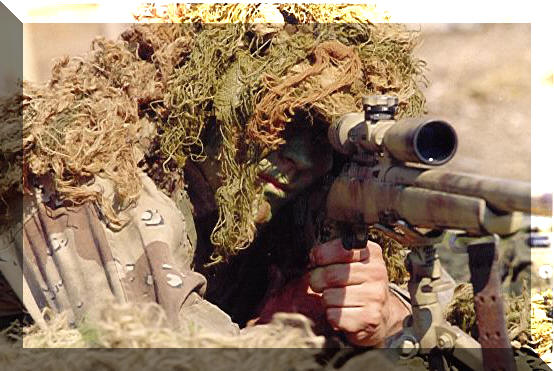 |
|
The decision
of kill or not to kill |
In Vietnam I had the choice to either pull the trigger or not.
There was no one standing behind me shouting, "Shoot, Cliff!
Shoot!"
I decided who lived
and died. I decided who was the enemy and who wasn't.
Some believe that a
warrior becomes twisted in combat, and loses all sense of morality,
that he or she turns into a sheer killing machine, void of any
compassion for human life.
Nothing could be
more untrue.
Ironically,
morality is heightened in war.
The difference
between right and wrong becomes startlingly clear. In a strange
but realistic way, the warrior becomes the arbitrator of life over
death. He or she assumes the power of a "god" when faced
with the decision to kill or not kill, to torture or not torture, to
seek revenge or not against an enemy who has killed, wounded and
maimed your fellow countrymen.
In my own case,
there were times when I chose not to shoot at an "enemy."
In one instance he was swimming madly across a river. I chose
not to shoot. In another instance I held back my fire by
instinct, when by every rule of war I could have emptied my magazine
into the target. It turned out to be a woman with her
children.
I have also stopped
other warriors from hurting civilians when they thought they were
being poisoned, for often war brings some to a breaking point where
they see everyone as an enemy, even the innocent. This
happens in normal society as well as in war when a person breaks and
goes on a killing rampage because he is fired, or his wife divorced
him, or he feels the world has turned against him.
When people ask me,
"How many people did you kill in war?," I return my standard answer.
"You should ask me, how many people did I choose not to kill!"
There is this false
assumption that war is all about killing.
If that were the
case America would have leveled every city in Iraq on its march to
Baghdad. It would not care about the lives of the civilians.
Historically,
conquering nations lay waste to the land, to create Fear, Intimidation
and Complacency in the population so they do not resist.
If the conquerors kill women and children indiscriminately, then they
would kill anyone who defied them once they took control.
America has avoided such
tactics as often as possible, for it has no desire to conquer nations.
In Vietnam, it never leveled Hanoi. Had it destroyed the
capital, it might have shifted the tides of war.
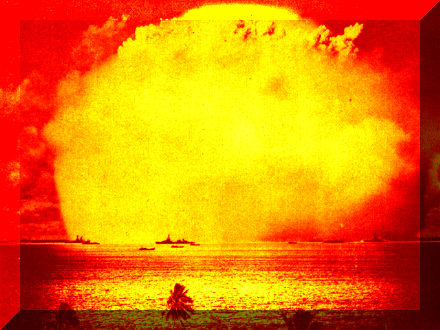 |
|
History suggests a moral decision was made to drop the A-bomb |
When the decision to drop the A-Bomb on Japan was made, it was weighed
against the loss of millions of lives if the U.S. invaded Japan.
All data indicated the loss of life would be reduced ten fold or more
by the use of the bomb. Was that a moral decision? A
humanitarian one? History has suggested it was, for Japan
stands today as a great nation, symbolic of how it rose out of the
ashes of Terrorism into a Vigilant country, one whose Constitution
includes denying war.
It is the
individual in war that decides its outcome. When the
resolve of the individual wanes, so does the willingness to bring the
war to an end. Americans have always held that Freedom and
Liberty for others is worth not only dying for, but to continue to die
for. Wave after wave after wave of American warriors have
died in strange places as proof of this commitment to bringing the
gift of Liberty to the oppressed.
This brings us to
the 250,000 Americans in Iraq. Each one has at least 250 people
who know them well enough to attend their wedding, or funeral.
That's more than 62 million people who know the Warriors of Vigilance
in Iraq.
It represents about
a quarter of the U.S. population.
Are these immoral
people? Are these men and women who seek to dominate others, who
have a history of tyranny and oppression? Are these child
abusers?
Or, are they average
Americans, average moral neighbors who are in Iraq for one reason, to
offer the people of that country the same rights we as Americans
enjoy--the freedom to decide our own destiny, and the right to speak
our minds without fear of retaliation?
My moral measurement of
America's involvement in Iraq is not gauged by any other barometer
than the chemistry of the 250,000 troops fighting for the liberation
of the Iraqi people.
This position flies in
the face of protestors and critics of American policy. It
tells me that the average American in Iraq is representing the
morality of 62 million Americans, those who comprise his or her
"circle of friends."
We are the sum of our
environment. Our friends reflect who we are, for they tend
to mirror our beliefs, our principles, our moral sinew.
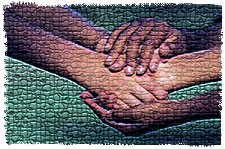 |
|
Friendship is
the most precious commodity a human being has to offer another |
While we may not agree with everything a friend believes, we tend to
believe in the marrow of that person, that he or she is far more good
than bad, that he or she is far more worthy than unworthy as a human
being. Otherwise, we would deny friendship, for friendship is
the most precious commodity a human being has to offer another.
It makes me wonder why
those who protest the war so vehemently don't stop and think about the
impact they are having on their friends who are fighting it.
If they were to use binoculars instead of monoculars to view their
acts, they might balance their vehemence and soften the invectives
they unleash against America's role in Iraq. They might
stop likening our presence in Iraq to those of Hitler, and stop
demeaning our actions as criminal.
The 250,000 Americans times 250
friends is a large chunk of humanity.
It provokes the question:
"Are my friends fighting for oil or liberty?"
Under the monocular vision, one
sees America as an oil hungry nation, ruled by business greed, seeking
to suck the black gold out of the Iraqi soil to turn its engines of
capitalism at the expense of the Iraqi people. Or, the monocular
view makes America look like a belligerent bully unilaterally showing
the world it is the "king of the hill" and using Iraq as a nail to
prove to the world the USA is a hammer to be feared.
The binocular view, however,
simplifies the narrowness. It shows 250,000 Americans, each with
the choice of firing their weapons or not, choosing to fight for the
Freedom of the Iraqi people at the expense of their own lives.
 |
|
The monocular
view |
Unfortunately, the binocular view doesn't incite riots, or draw
television cameras. To some, it is "bland patriotism."
They tend to scoff at the idea of Liberty and Freedom as the reasons
for Americans to fight and die in a foreign land. They find it
easier to hang an American death on the "war for oil" banner, or the
"America As An Empire" placard.
They forget the triggers of each weapon in Iraq are squeezed or not
squeezed by their neighbors, their sons, daughters, grandchildren,
brothers, sisters, cousins, nephews, schoolmates, workmates,
neighbors, the former grocery store clerk, their children's
schoolteacher's husband, or her brother, or first cousin.
Binocular vision is hard
to see for it requires us to look in the mirror and see the war not as
a reflection of a few errant leaders we may politically oppose, but
rather members of our family, members of our community, members of our
church or social and civic groups.
One of the people I know
well here in the East Village is a major war protestor. Her name
is Jane. She lives a life of constant protest, not necessarily
singling out war, but protests against all varied forms of violence.
She has a grand nephew who is a Marine sniper in Iraq. She
shared her pain with me that she was connected to someone who chooses
to fight with violence while she fights with non-violence.
It was a reminder to me of how
small our worlds really are, and that those who attack America are
attacking the family of America, not just the institution of it.
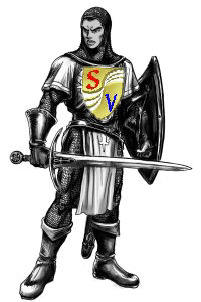
|
My job
as a TerrorHunter is not to bring Terror upon those who often
Terrorize America's role in Iraq. It is, hopefully, to help
those who see with monocular vision, use binoculars.
When attacks seem to be leveled at one target, and focus on one
subject, I get suspicious. I ask only that those who blind one
eye to the truth of who is fighting the war in Iraq realize it is
their neighbors, their relatives, their family.
At the least, that amounts to
more than 62 million family members directly related to the Warriors
of Vigilance in Iraq. If one were to trace the roots to
all relations, jumping from first to second to third cousins, and
friends of friends of friends, the number would be all encompassing.
The same holds true for the Iraqi
people.
A vast majority of them seek Freedom
and Liberty, the same kind Americans, the British and
Australians enjoy who are fighting for the removal of tyranny and
oppression. While on the surface it may appear there is a high
degree of resistance to being liberated by "Western forces," the
fundamentals of Liberty and Freedom prevail.
Mothers and fathers want their
children to have the best possible rights to live their lives without
the dangers dictators impose on societies. In the final
moments, when all the smoke clears and Saddam Hussein's Beast of
Terror lies bloated in the battlefield, the Iraqi people will hail
Liberty and Freedom.
It is their right. It is
their children's right. And their Children's Children's
Children's right.
The 25 million citizens of Iraq do
not support Saddam. Most of them tolerate his rule, for they
have little choice in the matter. When the fully realize
they have a choice, I have little doubt they will seize that right as
fervently as Japan did, or Europe did following World War II, or the
South Koreans have, or the Russians have after the fall of communism.
Freedom is one neighborhood.
Liberty is one land. Even though some nations carve up
territory and claim sovereignty, there is no validity to sovereignty
when it is dictated to the people by leadership that rules by Terror.
Sovereignty only belongs to the individuals
of a nation. It is the sum of their opinions that form the state
of any nation and true conscience of any country.
The United Nations has attempted to
negotiate not with the people of nations, but with leaders who rule
those nations. The result has been Complacency.
America's unilateral drive to free Iraq is not truly unilateral.
America is only exercising the rights of
the people to live free of tyranny, and to elect leadership and
unelect them that reflect the people's goals, not the leader's.
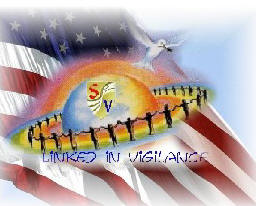 |
|
Americans are
linked to the families of Iraq |
Americans are connected by the "global family"
to all the families of Iraq. In the final analysis,
we are all related, all brothers and sisters, all mothers
and fathers, all cousins, nephews, nieces, grandparents,
and uncles and aunts of Vigilance for the Children.
We are custodians
of their future.
We are all Sentinels of
Vigilance.
So as we view the war in
Iraq, we face two choices.
We can look at it with a blind
eye and see all the reasons why we shouldn't be there.
Or, we can look at it with binocular
vision, and see all the reasons why if we weren't there,
we would be sacrificing the rights of our neighbors, our
friends, our relatives to live as we live--if they so
chose to do so.
If you are looking at Iraq
with a blind eye, take it down.
Look with both eyes.
See the depth of purpose. And remember that the
true leaders of the war are the men and women on the front
lines, willing to die to bring to the Iraqi people what
they so deeply cherish--Freedom and Liberty for the Children's
Children's Children.

Mar. 24--Warriors Of Vigilance,
the Real War Protestors
©2001
- 2004, VigilanceVoice.com, All rights reserved -
a ((HYYPE))
design

|
|
|